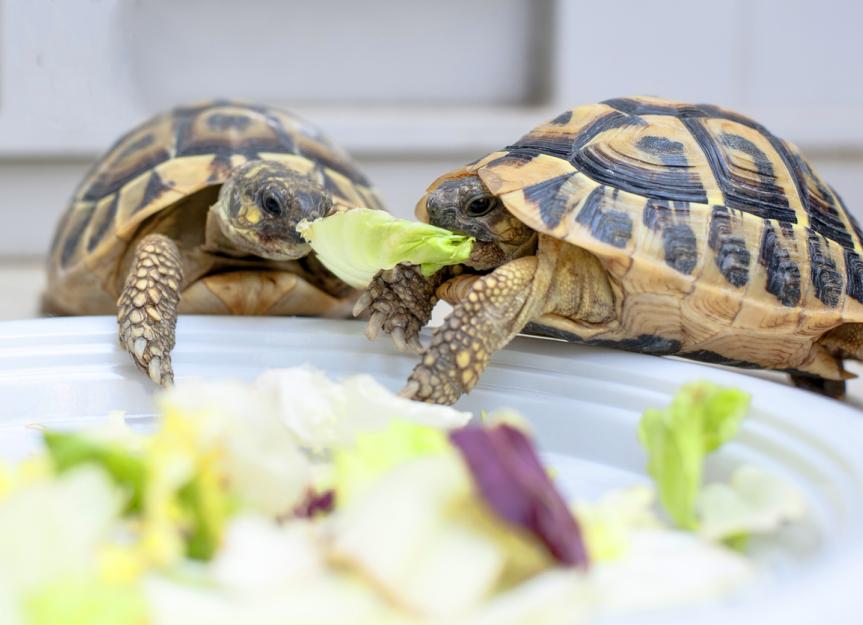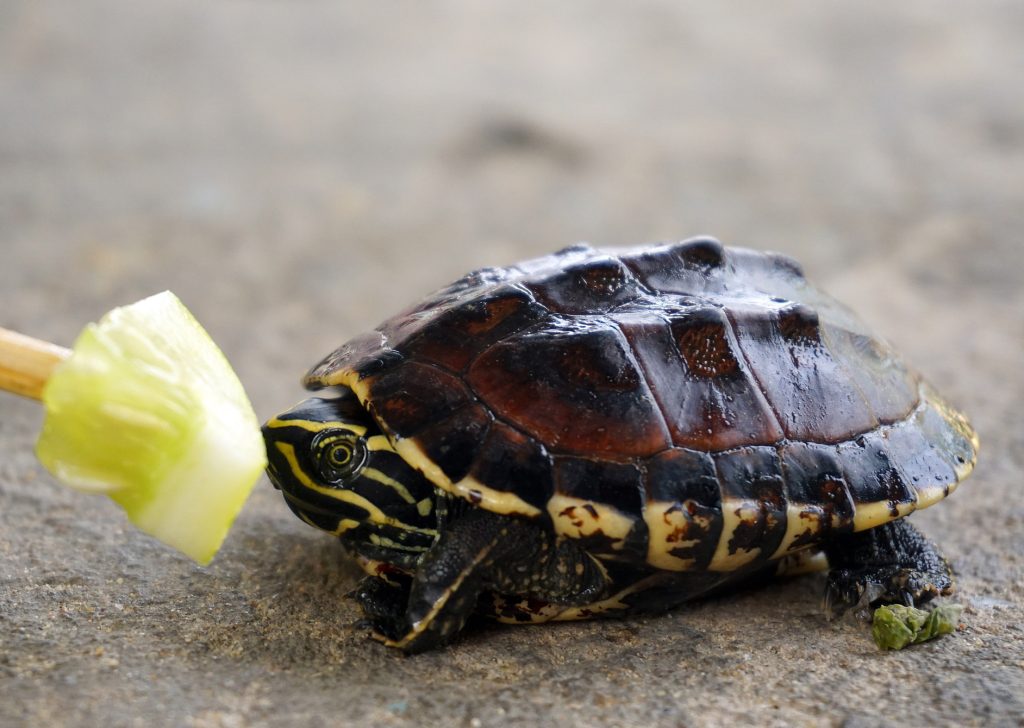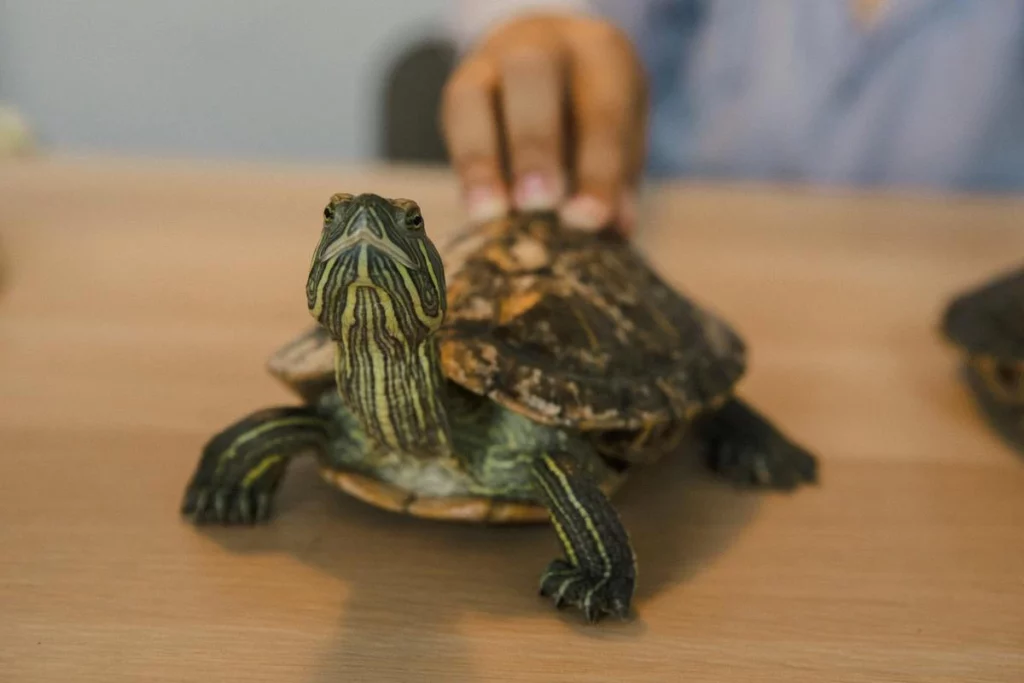How Long Can Turtles Live Without Food? 5 Turtle Feeding Queries Answered!

A healthy adult turtle can live 2-3 weeks without food if it gets appropriate lighting and has enough access to fresh drinking water.
A lot of people find keeping turtles relatively easier and fun, one of the many reasons being they don’t require continual feeding. Whether you’re at work 9-5 or away for a weekend vacation, leaving your pet alone without food isn’t that big of a deal. Neither are turtles sociable nor do they worry much about food because of their slow metabolism rate.
Have you queries about how long a turtle can go without food, how often they should eat, and similar things? You’ve landed at the right place! Keep reading to find out!
How Long Can Turtles Live Without Food?
Various factors, such as the turtle’s species, age, and general health, can affect how long it takes them to go without food. A healthy adult turtle can live 2-3 weeks without food if it gets appropriate lighting and has enough access to fresh drinking water.
For some turtles that have been fed the right diet throughout their life, they may survive even months without eating. A pet red-eared slider can go for weeks up to 3 months without eating under the right conditions. Whereas painted turtles may survive 4-6 months under extreme conditions.
Again, turtles like the box turtle can live longer without food availability because of their ability to enter a state called torpor, which enables them to slow down their metabolism and preserve energy. A box turtle can generally live 6-8 months without food.
How Long Can Baby Turtles Live Without Food?

Baby turtles can go between 1-2 weeks without eating, but to prevent them from becoming too weak or malnourished, it’s best to give them a small quantity of food each day.
Turtle hatchlings require a lot of bug food to grow and develop. However, as they age, their diet can gradually be changed, and their feeding time can be adjusted accordingly.
What Are The Factors Affecting The Survival of Turtles Without Food?
Here are the factors that affect how long your turtle will survive without food:
Water Source Accessible To The Turtle
The turtles need to have constant access to water sources 24/7. It can live longer without food if it has access to enough water for drinking and swimming.
Age and Species of The Turtle
Compared to adult turtles, young ones have a faster metabolism and need more food. Again, distinct turtle species have distinct metabolic rates and dietary needs. Box turtles, for instance, are known to be able to go without food for months, while some can survive only a few weeks.
The Health of the Turtle
A healthy turtle with better activity, basking behavior, and eager feeding behavior can survive longer without food than an ill or weak one.
Environmental Factors
A turtle’s metabolism will be slower and require less food in a cooler environment, whereas its metabolism will be faster and require more food in a warmer one.
Again, to maintain a healthy metabolism, your turtle should have access to a basking area with bulbs in the tank that provide the right light. Because it boosts their appetite, and activity turtles require regular exposure to UVA light.
Why Is My Turtle Not Eating?

The reasons why your turtle isn’t eating like it regularly does, maybe the following:
- Slow metabolism due to lack of access to daily UVA light
- Temperature drop in the water tank
- Preparation for hibernation in winter
- Stress because of being shifted to a new tank or environment
If you think the reason for your turtle not eating isn’t any of the above reasons, and showing inactivity, he or she may be ill and in need of veterinarian attention.
How Often Should I Feed My Turtle?
Remember that your turtle shouldn’t be kept unfed for too long. The shell can become thin due to malnutrition, which can also cause organ damage and other medical issues. In severe cases, it can be fatal. Here’s how often you should feed your turtle:
Baby Turtle:
When a turtle is small enough to fit in the palm of your hand, it is said to be a baby; for the majority of turtle species, this period lasts for around 6 months. You should feed your turtle every day with daily protein sources and veggies if it is still a baby.
Juvenile Turtle:
Juvenile turtles are the ones still growing, typically between ages 1 to 5. They are larger than hatchlings and on their way to becoming adults. If your turtle is a juvenile, you should feed it every other day with protein, along with veggies and leafy greens every now and then.
Adult Turtles:
Adult turtles are the ones that have reached their maximum size. If you have an adult turtle, you may feed it once after every 2 days with protein, and veggies regularly.
How To Feed Your Turtle While You’re On Vacation?
It is not always feasible to have someone watch over or take care of your tortoise while you are away. What to do in such cases?
Here’s what you may do:
- You don’t need to bother about feeding your turtle if your trip lasts only a couple of days or three. Adult turtles in good health can endure that time without food.
- You can leave it at a pet boarding service available nearby, or leave it at the home of a friend for a few days, where they will take care of it.
If the vacation is 1- 2 weeks long, and you don’t have anyone available to take care of your pet, here is how you may arrange food for your tortoise.
- The simplest way to solve the feeding problem of your turtle is an automatic food dispenser like the Eheim Turtle Feeder or Exo Terra Automatic Turtle Feeder. Your turtle food problem is solved for the upcoming few weeks, you just need to load in the food once and time it suitably.
- You may fill the aquarium with feeder fish for your tortoise to consume while you’re away. A feeder fish doesn’t need to be extremely big; it only has to be tiny enough for your turtle to consume and capture easily. You may fill the tank with fish like guppies, crappies, bluegills, or killifishes to serve as feeders.#
- Some water plants should be a good food source for your turtle for a number of weeks if it is an omnivore. You’ll easily find them in most pet stores and they can be kept in water for long periods of time without any issues.
Final Thoughts
Although turtles don’t require as much food as dogs or cats do, keeping them left unattended for long periods of time can run them into other dangers. You may leave your turtle a few weeks without food, but remember not to make it a habit, once or twice every 6 months or a year is more than enough.
Hope you found this article helpful!
